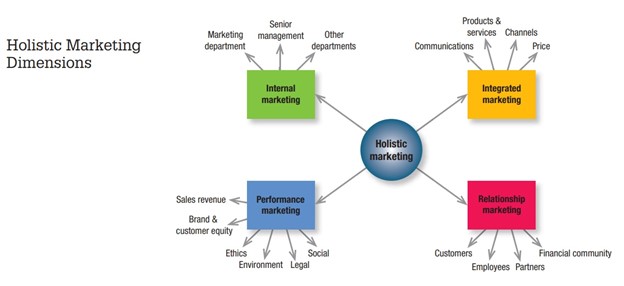As a solopreneur who launched my integrated marketing advisory and services firm, Au Advisors, much of my time is spent on identifying and qualifying prospective clients and then leading their journey to becoming contracted clients.
With one of my target segments being small businesses, I often hear the following during my early meetings with decision-makers: “We are too small to think about doing any marketing…”. As a small business myself, I understand their thinking. However, hearing this repeated comment provides me with the opportunity to introduce them to Holistic Marketing and provide education on how it contributes to their revenue goals.
Using a storyteller approach, I share the Holistic Marketing framework and describe how their business is already doing much of this work organically in their day-to-day operations.

This descriptive “Holistic Marketing Dimensions” illustration is taken from author Phillip Kotler’s book, Marketing Management 15th Edition (2016), and visually represents the breadth of holistic marketing. Let’s take a look at each of its components and I’ll share the ways in which I tie each component into my conversations with small business owners.
INTERNAL MARKETING: This represents the ways in which all members of the organization adopt and believe in the company’s marketing efforts. Employees look to management for validation of the marketing plans (“top down” support).
I remind senior leaders that they already champion their company’s values, culture, and goals and that all levels of staff are expected to “live into” them every day. Marketers use those internal principles as the foundation for the businesses marketing campaigns.
INTEGRATED MARKETING: This ensures the company’s messaging is delivered and communicated consistently across multiple externally-facing channels and platforms.
In the majority of cases, a company has already established their brand and is selling their products or services through multiple channels (i.e. website, email communications, advertising, etc.). By unifying its messaging through consistent use of look-and-feel, tone of voice, color palette, imagery, verbiage, etc., it shows full company alignment on how it goes to market.
RELATIONSHIP MARKETING: Here, the focus is on developing authentic, meaningful, and deep relationships with customers, vendors, and COIs who directly or indirectly contribute to generating sales. (Centers of Influence are business or personal contacts with ties to a company’s areas of interest or target markets.)
Companies rely on relationships to grow their business. Their leadership team and employees are already unofficial ambassadors of the organization and (believe it or not) are already marketing! A Marketer will provide approved messaging for all levels of the business – via strategies such as talking points, with branded gifts, within marketing events, or through thought leadership pieces — so employees effectively become another channel of outreach.
PERFORMANCE MARKETING: Here is where the business and its employees actions drive marketing ROI in areas including brand recognition, product awareness, and sales. A good marketing campaign will weave in the company’s goals, values, and support of strategic initiatives such as ESG and DEI, amongst others.
By including, sharing, and reinforcing the company’s culture and values in their go-to-market outreach, it contributes to amplifying their visibility in the marketplace and contributing to sales.
While the recommendation of adding Holistic Marketing to a small business might seem like an unnecessary investment, oftentimes once an understanding of its principles and an awareness that many of its components are already part of their organization’s culture, decision-makers realize the benefits of having a unified brand, message, and activation plan. Holistic Marketing does contribute to generating revenue!
To enhance your knowledge of marketing principles, click here to learn about Intention-Based Communication.
If you haven’t already joined our Au Advisors community, click here to sign-up for notifications of new content.
